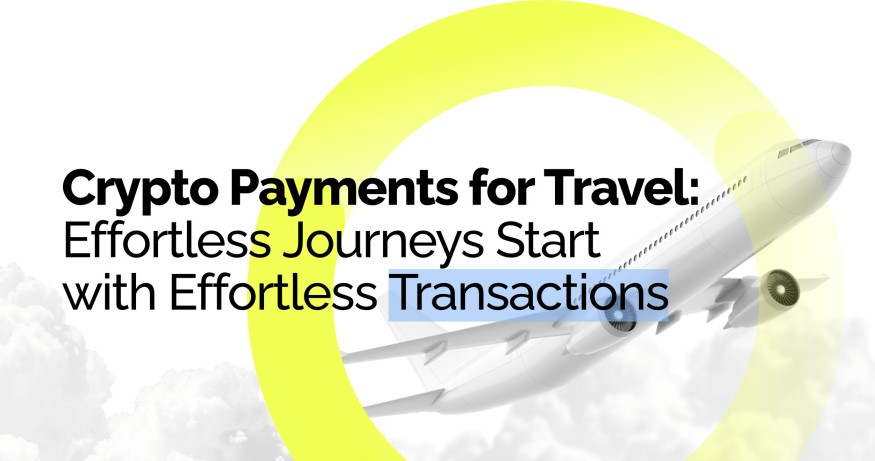
Nothing kills the travel booking buzz quite like watching a 3–5% foreign transaction fee appear out of nowhere. Well, those days might finally be coming to an end. The travel industry is flipping the script on payments, and crypto is leading the charge.
What started as a fringe tech experiment has quietly become a practical upgrade that's reshaping how we book and pay for travel. The proof is in the numbers: CoinsPaid, a global cryptocurrency payment gateway, has recorded a 38% year-over-year surge in cryptocurrency transactions among its travel sector clients.
The reason behind this shift is simple. Travelers want speed, flexibility, and security, while businesses want lower costs, instant settlements, and global reach. Crypto delivers on both fronts.
"Crypto isn't a novelty anymore," says Max Krupyshev, CEO of CoinsPaid. "In 2025, it's just a better way to do business."
Travel Providers Are Making the Switch
Travel providers are turning to crypto not as a trend, but as infrastructure. Mirai Flights, a private jet operator, thanks to CoinsPaid's solution, slashed its payment processing fees by 75%.
That kind of margin matters. Especially in an industry known for razor-thin profits and complex cross-border payments, saving on fees and eliminating lags is essential for competitiveness.
What makes crypto so effective? CoinsPaid supports over 20 top digital assets and offers instant fiat conversion, allowing businesses to receive payments in crypto while maintaining stability and local currency. That means no stress over price volatility. Another advantage is that users do not require blockchain experience, and onboarding takes less than 48 hours.
"You don't need to be a blockchain expert," Krupyshev says. "You just need a gateway that works and keeps you compliant."
Additionally, the ease of setup and flexibility in functionality mean that even smaller travel companies without a big IT budget can offer cutting-edge payment options with minimal disruption to their operations.

The Crypto Traveler Spends Differently
The story isn't just about businesses. It's also about the people booking trips, flights, and hotel stays with crypto, and how they're changing the market.
Look at Travala.com, a blockchain-based travel platform. In 2024, it processed $103 million in bookings, 80% of which were paid in crypto. Even more impressive: those crypto users spent 2.5 times more per booking than their fiat-paying counterparts.
In short, this isn't a low-value customer segment. It's a high-spending, globally minded demographic that travel companies can't afford to overlook.
And it's not just tech bros anymore.
"We're seeing a real shift in who's using crypto—and why," says Krupyshev. "It's no longer just early adopters. It's practical users seeking efficiency and reliability."
Think of freelancers working from Bali, digital nomads hopping borders every month, or families in high-inflation economies looking for payment options that won't evaporate overnight. These travelers need payment tools as agile as they are.
Unlike traditional credit cards or bank transfers, crypto provides a universal solution that doesn't depend on local infrastructure or traditional banking rails.
Crypto: A Cost-Cutter with Global Reach
The financial case is compelling. Cross-border transaction fees traditionally fall between 3% and 7%, but crypto is changing the math. CoinsPaid offers a flat, transparent model, cutting out layers of hidden fees and delays.
One OTA operations director summed it up simply: "Once we mapped the true cost of fiat across currencies and markets, switching to crypto was a no-brainer."
In regions such as Latin America, Southeast Asia, and Eastern Europe, where currency instability and banking limitations are prevalent, crypto isn't only more efficient, but also more accessible.
CoinsPaid projects that by 2027, crypto could represent up to 15% of travel bookings in these emerging markets. In these places, crypto is about access.
For travelers in these regions, having the ability to pay with stablecoins or other digital assets opens up new opportunities. It enables them to book international flights, reserve accommodations, and manage spending without relying on unreliable or inflated local currencies.

Easier Than You Think
Integrating crypto is no longer complex. CoinsPaid has removed the heavy lift from implementation in these ways:
- Instant fiat conversion to reduce volatility
- Support for 20+ top cryptocurrencies
- Built-in KYC/AML compliance tools
- Onboarding in under two days
There's even a checklist for providers who want to test their crypto readiness using these steps:
- Review cross-border processing costs
- Evaluate platforms that offer instant fiat conversion
- Check for automated compliance tools
- Measure implementation lift (hint: it's light)
- Focus on growth markets and young, mobile users
All of this makes adopting crypto not just viable, but logical. Especially for providers already navigating international payments, adding a crypto option is less of a leap and more of a smart pivot.
From Trend to Infrastructure
Crypto is the next phase of travel evolution. As global travelers demand faster, safer, and more flexible payment options, companies that adapt quickly will stand out.
"Crypto is becoming part of the core financial infrastructure," Krupyshev concludes. "And travel is one of the first industries to benefit."
This isn't a story about the future, because it's already happening. The only question left is: when your next customer wants to pay with crypto, will you be ready?
This article is copyrighted by Travelers Today, the travel news leader



